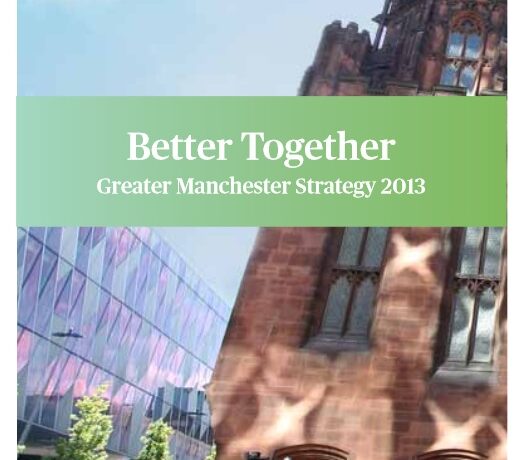Manchester refreshes strategy to cement second city status
An updated version of the Greater Manchester Strategy, the blueprint that shapes public funding bids and spending policy around the city region, has been published to reflect changes in the national and international economic and political landscape.
The 77-page document was published jointly by Greater Manchester Combined Authority, Association of Greater Manchester Authorities and Greater Manchester Local Enterprise Partnership following a consultation period held during the summer.
See link to download report below
There is much that has been covered before about the need for improved international links, better schools, importance of the low carbon economy and developing new technologies with the help of the universities. Existing pots of money are cited such as Regional Growth Fund and the £1.5bn transport investment programme agreed with government in Manchester's City Deal.
However, the refreshed paper, updating its 2009 predecessor, concentrates on the need to "increase self-reliance" and to fulfill the city's potential as the "best placed city outside London to increase its long-term growth rate". To do this, Manchester will continue to ask Government for more power and more money.
Among the "reassessed approach" needed to achieve self-reliance, the strategy says the city must:
Focus on public sector reform, become a net contributor to national economy. GM generates £48bn a year, 4% of national economy, but is a cost centre to government requiring £22bn of public spending a year, but only generating £17bn in taxes. Aspiration is to close £5bn deficit, through increased workforce and economic activity. Austerity cuts to public services have been countered by increased welfare bill
Consolidate business base and make Manchester "investment destination of choice" to help "secure a much higher growth rate in key sectors…health, life sciences, professional and financial, creative and digital, universities"
"Deepen and broaden" economic catchment area to east and west across North of England to capitalise on "Manchester Corridor" of motorways, railways and "flow of people, goods and ideas through Greater Manchester"
The Manchester 'Family' of organisations answerable to AGMA and the Combined Authority will be "aligned and streamlined" to improve efficiency: reviews are underway at investment agency Midas, tourism and branding agency Marketing Manchester, business support provider Manchester Solutions and policy advisor New Economy. New Economy will be renamed, though no name has been announced.
There are proposed constitutional changes to enable GMCA and AGMA to have more control over decisions taken by the LEP and European Regional Development Fund committees.
AGMA will be incorporated within the Combined Authority "to widen the scope of decisions on a statutory basis".
The Combined Authority, which came into effect in April 2011 with power across the 10 council boroughs relating to transport, economic development and regeneration, is now "seeking to broaden the range of devolved accountabilities, including the negotiation of a place-based settlement with Government, to secure greater influence over delivery of public services and to enable radical long-term reform."
The detailed implementation plan for this new economic vision will be contained in a follow-up Growth & Reform Plan which is currently being drafted to "outline how we will deliver across the priorities identified in the Greater Manchester Strategy".
The Government published its Growth Deal guidance in July, effectively the latest set of policy boxes to tick when bidding for central government money and agreeing targets from a local perspective.
Greater Manchester LEP chairman Mike Blackburn told his board when they met in September that he "had been discussing the issue of growth and reforms plans with the chairs of the other LEPs and it appears that GM is more advanced and organised in its thinking and progress."
The Growth & Reform plan, when it is published, will "reflect the breadth of our objectives, emphasising the interconnectivity of the growth and reform agendas, and demonstrating to Government an opportunity to work with us on a much wider agenda that will enable us to achieve our objective of financial self-sustainability."
There were 80 consultees and respondents during the summer consultation period, mainly public authorities such as health and transport agencies although property companies Bruntwood and Peel Group are listed.





Those drugged clutzes in the town hall should sort out the major problems with the city’s roads. Tools.
By Bradley
Without a seaport Manchester is not even third rate revisit the treasure in your past regenerate your port
By rob bob
But Birmingham is the 2nd City outside London – so impossible really?
By Dennis
Manchester’s been chomping at that bit for years, based on the stength of the popular culture, sport, identity metrics. So, who is 2nd dog, then? It’s an interesting one, unless you’re from Norwich.
By Petroceli
I would say definitely Birmingham is 2nd dog. For more reasons than listed for Manchester. Plus the fact that in regard to London – it is in a more ‘acceptable place’ than Manchester. I dont think football or popular culture will help I think its the weight of whats there and how established it is – which Manchester isnt.
By Dennis
Birmingham is too close to London to be the second city. Manchester stands apart with its own sphere of influence.
By CEF
The Brum Vs Manc 2nd city debate has been bubbling along for quite a few years now. Manchester sort of believes it is 2nd city whilst Birmingham pretends it hasn’t really noticed Manchester’s claims. It’s an interesting debate and I certainly think Birmingham has conceded ground over the past 20-odd years. What is the official ranking? Is Birmingham still 2nd dog? I think it is, really.
By Petrocelli